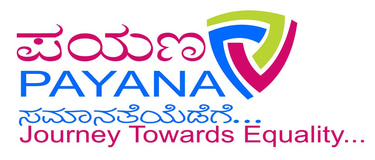Foreword
Founded in 2009 and headquartered in Bangalore, Karnataka, Payana (meaning “Journey” in the
Kannada language) stands as a beacon of hope and empowerment for the sexuality minority
community in the State. As a registered society recognized by the Government of India, Payana's
overarching aim is to combat stigma and discrimination while fostering equality and social justice for
its members. The organization strives to provide individuals with the necessary opportunities to
develop to their full potential.
Members of Payana initially came together in 2008 as a group of equals- in an effort to establish
alternative spaces, as a counter to the existing spaces which did not provide a conducive venue for
individual expression; as an idea of an open space, where everyone would have a voice, a sense of
belonging, an ownership in their ideas as individuals. Payana’s work was largely propelled by a desire
to be an inclusive group- one which welcomed all people of diverse gender identity and expression-
and not focused on a particular or visible category of persons.
Payana is a fully community owned and managed organization which emphasizes the development
of its constituency through transparent processes and self-involvement. We work in tandem with
society. This is done by providing forward and backward linkages to the community and the society
as well, leading to recognition, acceptance and inclusion in the larger society. Our community hopes
to be instrumental not only for our own empowerment but towards removing all forms of
marginalization from society.
A Community-Driven Initiative
At its core, Payana is a testament to the power of community organization. Emerging from the
collective initiative of individuals within the sexuality minority community, Payana was born out of
the necessity for a platform where all voices would be heard and recognized. Payana has also been
acclaimed as a singular endeavour by working class sexuality minorities to come together and
organise themselves without any external intervention. It is governed by a seven-member Board of
Directors.
Payana's commitment to inclusivity extends beyond visible identities, encompassing a diverse
spectrum of gender orientations and expressions. Recognizing the unique challenges faced by non-
English speaking sexuality minorities from rural and semi-urban backgrounds, Payana has prioritized
support for these marginalized communities, providing vital resources and advocacy efforts.
Payana remains dedicated to empowering non-English speaking sexuality minorities, predominantly
comprising gender non-binary and trans-persons from rural and semi-urban areas, including Kothi,
Hijras, Jogappa/ Jogamma and other regional identities. Additionally, Payana supports DoubleDecker
and bisexual identities within this beneficiary community. Payana works to overcome challenges of
the community’s vulnerability to marginalization and social stigma, particularly in accessing state
benefits and protective support structures.
The MSM community, encompassing Kothi, DoubleDecker, and bisexual identities within the
sexuality minority community, face significant inequalities in education, occupation, legal
Page 2 of 3
frameworks, and access to healthcare and economic opportunities. Discrimination and social stigma
further marginalize them, hindering their access to welfare schemes and services. Despite this,
policymakers often focus solely on visible transgender populations, overlooking the diverse
spectrum of identities and gender expressions within sexuality minorities.
In Karnataka, data indicates that the majority of sexuality minorities are men who prefer presenting
themselves as male. However, their experiences are often sidelined in discussions on sexuality and
gender. This highlights the ongoing challenge of shifting societal attitudes towards the diverse
identities within the sexuality minority community.
At the same time, Hijras, members of the Transgendered community who are the most visible
among the LGBTQ community, equally experience fear, stigma and discrimination which is a
negative repercussion of their visibility. Despite this, there have been no concerted efforts made
towards improving their psychological well-being. Each category brings with them their unique set of
problems, issues and struggles.
Through strategic collaborations with governmental and non-governmental organizations, Payana
has worked tirelessly to address systemic inequalities faced by the sexuality minority community.
From targeted interventions to capacity-building initiatives, Payana's holistic approach seeks to
empower individuals, challenge social norms, and foster dialogue on critical issues.
A Vision for Change
Looking ahead, Payana remains steadfast in its vision for a world where sexuality minorities are
treated with dignity and respect, free from stigma and discrimination. With a dedicated team of
professionals and volunteers, Payana continues to lead the charge towards equality, social justice,
and empowerment for all.
Payana is supported by funding grants from domestic and international foundations, trusts and
governments. Grants, donations and contributions made to Payana are eligible for exemptions u/s
80(G) of the Income Tax Act, 1961. Payana is eligible to receive philanthropic grants under Corporate
Social Responsibility approach. Payana is also registered under the Foreign Contribution (Regulation)
Act, 2010.
Need for Organisational Policy Documents
Through these organizational policies and manuals documents, Payana hopes to ensure consistency,
accountability, and transparency in its operations, provide clear guidelines for staff and volunteers,
and to comply with legal and regulatory requirements, thereby enhancing our credibility and
effectiveness in achieving our mission.
Page 3 of 3
List of documents available:
1. Human Resources Policy
2. Finance Policy
3. Prevention Of Sexual Harassment Policy (POSH)
4. Child Protection Policy
5. Confidentiality and Privacy Policy
6. Conflict of Interest Policy
7. Corporate Social Responsibility Policy
8. Equal Employment Opportunities and Affirmative Action Policy
9. Emergency Response and Crisis Intervention
10. Grievance Redressal Mechanism and Complaints Policy
11. Information Technology and Data Protection Policy
12. Procurements Policy
13. Whistleblower Protection Policy
14. Code of Ethics Policy


